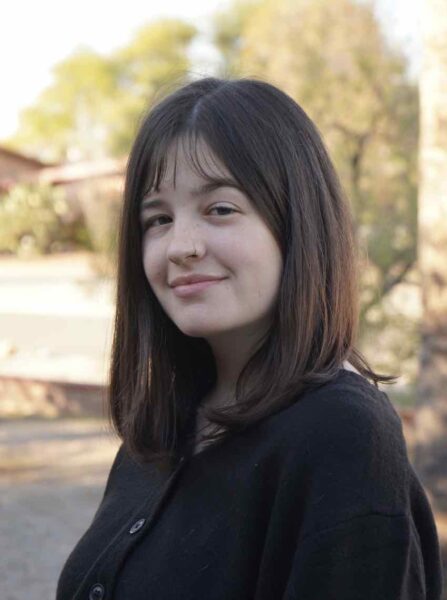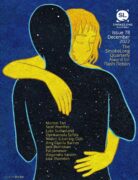The first-person plural point of view seems perfectly suited for this story, giving voice to this group of students who hope for a change in the perceived trajectory of their collective future. Can you tell us how you settled on this point of view?
Thank you! I was intrigued by the idea of the first-person plural, which I’d never used before, and this was actually what opened the door to the entire premise of the story. I was thinking about my experience as a child in a very small school where we’d all known each other for many years. There were opinions that were held communally, and I remember vividly this naivety of youth that often leads, unwittingly, to cruelty. In this situation no person is personally guilty of anything terrible, but, as a group, they feel no obligation of sympathy towards the dying because they don’t have an understanding of mortality, except in a vague, factual way. They are forced to come face to face with this idea in such a sudden way that it reverberates through the rest of their lives and their connections with each other.
You blend the use of the “we” with the specific characters so well—the story zooms in on Emma and Patrick and Lillian and their implied shenanigans, while the sick boy remains unnamed and separate from the rest. Was it hard to resist naming him? What went into that craft choice?
From the beginning of the writing process, I felt very certain that I didn’t want to name him. It helps to further this idea of him as other, excluded from the gossip about crushes and middle school drama, excluded from regular life. His situation is so incomprehensible to them that he is nearly mythical. In addition, their lives have all continued, while he has been left in the past. He remains prominent in their memories, but, as time passes, he also becomes a symbol for something else—for the first person they knew who died, for a lesson they learned. This is part of the tragedy, that, though he was a full and complete person at any age, he never got to grow and become who he would’ve become. He remains just him.
This group had dreams that stretched seemingly beyond their school and their town. Do you think any of them “got out” and escaped their perceived trajectory?
Yes! I think many of them did “get out,” to whatever degree anyone ever does. This probably looked quite different than what they imagined when they were thirteen. It’s unlikely any of them became models or celebrities, but happiness takes a different shape as you get older. Regardless of whether they individually moved from their town or didn’t, they find themselves back in their old ways when they’re brought together again. A defining part of their time together as children was this experience with the boy, which is, even in the present, something their sense of collectivity hinges on. Their reunions are akin to the visit to the museum, a revisiting of what once was.
I’m curious about the leap in time at the end of your piece—I’m struck that these kids who’d hoped for more in life than their perceived trajectory end up at the same reunions, feeling the same mix of guilt and greed. Was that a deliberate choice to show how this class remained a collective decades later? How did you land on the guilt they carry being akin to greed?
Their continued collectivity is circumstantial, and these reunions create the perfect environment for reflection on this time of their lives. I think it’s a greed we all have—we all feel like life isn’t long enough, or is passing too fast, even if we are lucky enough to live full, long lives. I don’t want to portray them at all like they are bad people, or that, even as children, they were acting maliciously. They are just, then and now, fighting against the inevitable ending to each of their individual stories. To know someone who was dealt a different hand causes guilt—you’re heartbroken for them, you really are, and you can’t help but be happy that for you it was different. They would never get together and say, “Thank God it wasn’t me,” but they have to contend with that feeling within themselves.
I notice from your bio that you also write screenplays. That’s amazing! How do you think your love of film writing influences your fiction writing?
Thanks! I spent four years in film school where I really didn’t write much fiction at all, and was very lucky that, when I came back to it, I had picked up new skills that had helped my prose writing grow even when I wasn’t actively working at it. While studying screenwriting, I read a lot of plays and screenplays where I really focused on dialogue and mostly tried to emulate screenwriters/playwrights who I thought wrote very naturalistic dialogue. I also like to have a very strong picture of the scene inside my head as I write and try to portray the visual aspects of the story clearly. I think no matter what genre, I’ve always looked for writers that I feel write very honestly and directly and I try to do the same myself!



 The core workshop of SmokeLong Fitness is all in writing, so you can take part from anywhere at anytime. We are excited about creating a supportive, consistent and structured environment for flash writers to work on their craft in a community. We are thrilled and proud to say that our workshop participants have won, placed, or been listed in every major flash competition. Community works.
The core workshop of SmokeLong Fitness is all in writing, so you can take part from anywhere at anytime. We are excited about creating a supportive, consistent and structured environment for flash writers to work on their craft in a community. We are thrilled and proud to say that our workshop participants have won, placed, or been listed in every major flash competition. Community works.